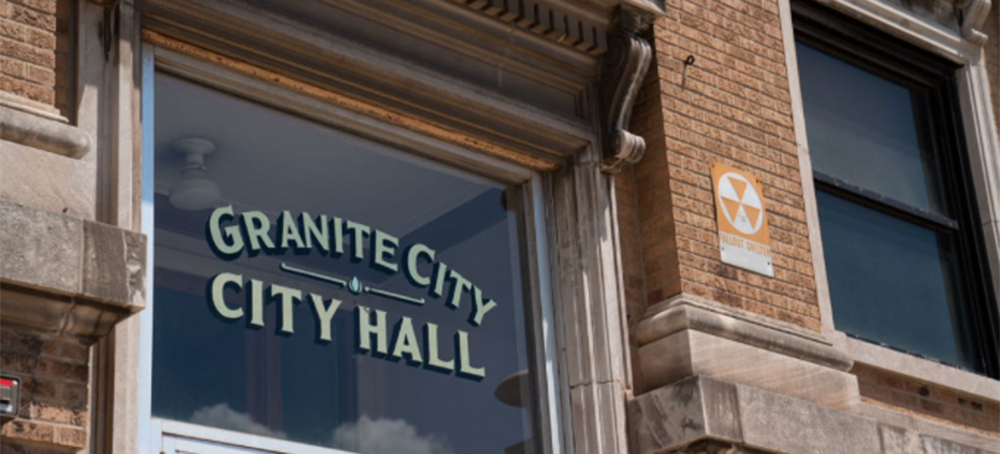A Court Just Ruled Collective Punishment Is Legal in America
Sam Gedge The Daily Beast Granite City's City Hall building. (photo: Institute for Justice)
Granite City's City Hall building. (photo: Institute for Justice)
A family faced eviction from their home because a family member who didn’t live with them committed a crime. This is the law of the land in some American towns.
It was an everyday crime in an everyday steel town, just across the Mississippi River from St. Louis.
In the days to come, however, things turned from mundane to bizarre. The woman’s mother, Debi Brumit, happened to live in Granite City in a home she shared with her long-time partner, Andy Simpson, and two of her grandchildren, then a toddler and a baby. They’re good people. Their landlord liked them and wanted to keep them as tenants.
But days after Debi’s daughter stole the van, Debi and her landlord received a letter from the Granite City Police Department. Regardless of the landlord’s preferences, the police said Debi and Andy had to be evicted because of their association with a lawbreaker.
Debi hadn’t stolen the van. Neither had Andy. Nor the toddler. Nor the baby. Not a van thief among them.
No matter. The police did not care that everyone in the house was innocent. Granite City had spoken: Everyone must go.
Welcome to the topsy-turvy and cartoonishly malevolent world of “crime-free housing.” Benign in name, these laws are corrosive in reality. Under Granite City’s ordinance, police routinely forced private landlords to evict entire families if any household member—or even a guest—committed a felony anywhere within city limits.
In Debi’s case, her daughter did not even live with her. The daughter had been in town that weekend only because Debi had checked her into the hospital to get her treatment for substance abuse. When it came to collective punishment, Granite City didn’t sweat the details.
Once in 2019, the city ordered an entire family’s eviction because one household member kicked an officer’s shin at a church picnic. The city ordered another household’s eviction because one member shoplifted from the Walmart across town. Another case started when a household member drove drunk. The police even ordered a woman’s eviction because her child’s father was caught with drugs, and he often cared for their son at her home.
Between 2014 and 2019, Granite City issued more than 300 compulsory-eviction orders against families living within its borders. Many were based on crimes that did not occur at the homes targeted for eviction.
Debi and Andy ended up not losing their home. Represented by my law firm, the Institute for Justice, they secured a temporary restraining order against Granite City in federal court. And in the months that followed, the city modified its law’s most outlandish features.
So why should we care about this in 2022? For one thing, Granite City has continued to defend its old law vigorously. And in September, the judge in Debi and Andy’s case ruled that compulsory-eviction regimes like the one in Granite City are fine.
The guilt-by-association angle? The court shrugged it off as a valid tool of “crime deterrence and prevention.” A law mandating family-wide evictions was obviously “striking in its breadth and reach,” the court had noted earlier in the case, but curtailing collective punishment was no business of the federal courts.
Debi and Andy will appeal the decision, but their unjust and unnecessary plight puts a spotlight on the underreported fact that crime-free-housing laws remain a threat to the rights of thousands of renters nationwide.
Often, these laws fall hardest on low-income Black and Hispanic communities. One leading scholar, for example, has decried the “Jim Crow effects of crime-free housing ordinances.” Since 2019, the U.S. Department of Justice has been suing Hesperia, California, over a crime-free housing law that—the DOJ maintains—was racially discriminatory in both intent and effect. Meanwhile in June 2022, Faribault, Minnesota, paid a $685,000 settlement in a lawsuit challenging racially biased enforcement of its crime-free housing program.
Despite the court challenges, these types of laws remain pervasive. DeKalb, Illinois, is poised to convert its “three-strikes” policy into a more draconian one-strike regime. And in Sunbury, Pennsylvania, officials recently pledged to revive a law making it illegal for people to rent in the city if they’ve been convicted of a felony drug crime.
Dozens of towns and cities retain crime-free housing ordinances, from Illinois to Minnesota to California. That’s why we should continue to care, and that’s why Debi and Andy are persisting in their fight: to ensure that what happened to them cannot happen to anyone else ever again.



